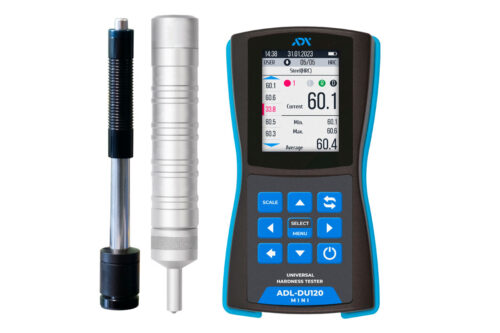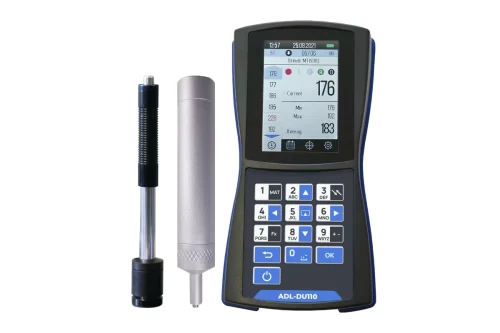Description
ADL-D100 in Uzbekistan, Tashkent
Using the device
The ADL-D100 will be an affordable and reliable solution to problems when disagreements arise between shops or contractors in the results obtained and when accepting parts, because the device performs measurements with an accuracy as close as possible to permanent hardness testers.
Properties
For workshop use, the device is manufactured in a rugged case, equipped with a bright 3.5-inch TFT LCD display with an easy-to-use interface.
Intelligent average mode, a unique statistical processing system and flexible memory organization allow for the most accurate hardness measurements.
The instrument allows calibration of one or two sample test blocks and spot calibration.
To make the results clearer, graphs are shown on the hardness tester display. Equipping the device with additional attachments for positioning makes the ADL-D100 hardness tester universal in use.
Main advantages:
Modern – made with modern electronic base. This allows you to implement more possibilities for software processing of results using various methods and algorithms.
Customized solutions – In addition to standard calibrations, it allows programming of a large number of custom calibrations, i.e. create custom scales based on standard plant hardness measurements (customer specific material).
Accuracy – modern components and a high-quality sensor allow you to carry out highly accurate measurements, as close as possible to the accuracy of permanent hardness testers, according to programmed calibrations.
Expertise – the creation, storage, accounting and configuration of non-standard scales for various materials makes this device universal in use between various workshops within the enterprise and among third parties.
A mini-computer is a device that represents a database on certain different materials of an enterprise and allows the accumulation of a knowledge base on the scale of these materials.
Reliability – Accurate, modern and reliable to use.
Warranty and post-warranty service is carried out immediately at the service center.
Additional equipment:
The device can be equipped with special positioning tips for measuring hardness on rough surfaces.
In addition to the standard “D” type sensor, “G” type sensors for high roughness surfaces and lightweight “E” type sensors are available.
The company can supply Rockwell, Brinell and Vickers hardness blocks, as well as certified standard SMTP 1, 2 hardness blocks.
To prepare the surface, the device can be equipped with an angle grinder and a set of consumables.
The ADL-D100 Portable Dynamic Hardness Tester is a handheld device used to measure the hardness of materials. Here’s some information about it:
- Dynamic Hardness Testing: This type of hardness testing involves applying a known force to an indenter (a small probe or ball) and measuring the depth or energy of the indentation. The hardness value is then calculated based on the material’s response to the applied force.
- Portable Design: The ADL-D100 is designed to be portable, allowing users to easily carry it to different locations for on-site testing.
- Measurement Principle: The device likely operates on the principle of dynamic hardness testing, where a known force is applied dynamically to the surface of the material, and the rebound velocity or energy is measured and correlated to the material’s hardness.
- Indenter: The ADL-D100 would come with an indenter, which is the part of the device that makes contact with the material’s surface and applies the force.
- Display and Controls: It would feature a display screen to show measurement readings and settings. Additionally, it would have controls and buttons for operation and configuration.
- Measurement Range: The device would have a specified measurement range, indicating the hardness values it can accurately measure.
- Accuracy and Precision: The specifications would include the device’s accuracy and precision in measuring hardness, typically expressed as a percentage of the measured value or in specific units.
- Applications: Portable dynamic hardness testers like the ADL-D100 are used in various industries such as manufacturing, metallurgy, automotive, aerospace, and quality control to assess the hardness of materials like metals, alloys, plastics, and composites.
- Data Storage and Transfer: Some models may have the capability to store measurement data for later analysis or transfer it to a computer for further processing.
- Battery Power: The device likely operates on battery power, allowing it to be used in various locations without the need for a power outlet.
- Calibration: Periodic calibration is necessary to ensure the accuracy of the measurements. The ADL-D100 would likely come with instructions for calibration or may need to be calibrated by a certified technician.
Overall, the ADL-D100 Portable Dynamic Hardness Tester is a convenient and reliable tool for assessing the hardness of materials in different industrial settings.
Other products with cateegory Mechanical tests




